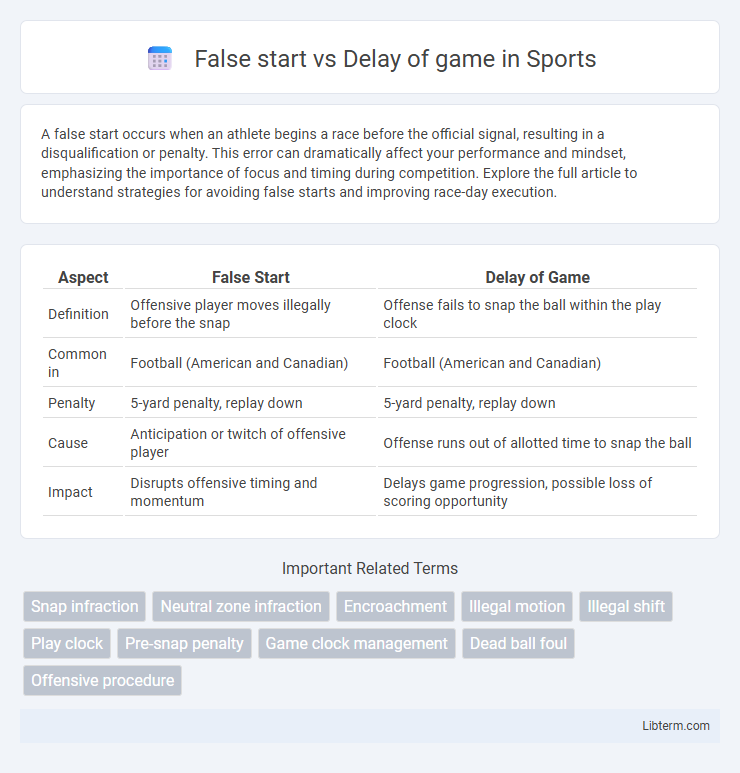A false start occurs when an athlete begins a race before the official signal, resulting in a disqualification or penalty. This error can dramatically affect your performance and mindset, emphasizing the importance of focus and timing during competition. Explore the full article to understand strategies for avoiding false starts and improving race-day execution.
Table of Comparison
| Aspect | False Start | Delay of Game |
|---|---|---|
| Definition | Offensive player moves illegally before the snap | Offense fails to snap the ball within the play clock |
| Common in | Football (American and Canadian) | Football (American and Canadian) |
| Penalty | 5-yard penalty, replay down | 5-yard penalty, replay down |
| Cause | Anticipation or twitch of offensive player | Offense runs out of allotted time to snap the ball |
| Impact | Disrupts offensive timing and momentum | Delays game progression, possible loss of scoring opportunity |
Understanding False Start and Delay of Game
False start occurs when an offensive player moves illegally before the snap, resulting in a five-yard penalty, disrupting the timing of the play. Delay of game happens when the offense fails to snap the ball before the play clock expires, incurring a five-yard penalty and costing valuable time. Recognizing these infractions is crucial for maintaining game flow and strategic management in football.
Definition of False Start
A false start occurs when an offensive player moves illegally before the snap, causing the play to be stopped and a penalty assessed. This infraction primarily involves players on the offensive line or backfield initiating motion prematurely, unlike delay of game, which results from the offense failing to snap the ball within the play clock. The false start penalty typically results in a loss of five yards and replay of the down.
Definition of Delay of Game
Delay of game occurs when the offense fails to snap the ball before the play clock expires, resulting in a penalty that hinders the team's momentum. Unlike a false start, which is an offensive player's premature movement causing an immediate stoppage, delay of game is a procedural infraction based on timing. This penalty is typically marked by a 5-yard loss and serves to maintain the pace and fairness of the game.
Key Differences Between False Start and Delay of Game
False start and delay of game are distinct penalties in football, with false start occurring when an offensive player moves illegally before the snap, disrupting the timing of the play. Delay of game happens when the offense fails to snap the ball within the play clock's allotted time, typically 25 or 40 seconds, resulting in a stoppage. The key difference lies in false start being an illegal movement penalty causing an immediate halt, while delay of game is a procedural penalty related to time management before the snap.
Common Causes of False Start
Common causes of false starts in football include offensive linemen moving prematurely before the snap, wide receivers making early motions not allowed by the rules, and quarterbacks slightly flinching or adjusting too soon. These actions disrupt the timing of the play and result in a five-yard penalty. In contrast, delay of game occurs when the offense fails to snap the ball before the play clock expires, reflecting a lapse in play management rather than an illegal movement.
Typical Scenarios for Delay of Game
Delay of game occurs typically when the offense fails to snap the ball before the play clock expires, often seen in situations with heavy pressure from the defense or confusion in play calling. This penalty is common during late-game scenarios where teams attempt to conserve time or need quick substitutions but are slowed down by miscommunication or fatigue. Unlike false start, which is a movement by the offense before the snap, delay of game is strictly a timing violation that halts the momentum and results in a loss of yardage.
Penalties for Each Infraction
False start penalties in football result in a 5-yard loss enforced from the line of scrimmage, triggered when an offensive player moves illegally before the snap. Delay of game penalties also incur a 5-yard loss but occur if the offense fails to snap the ball before the play clock expires. Both penalties disrupt offensive momentum but are distinguished by the nature of the infraction: pre-snap physical movement versus failure to initiate the play timely.
Impact on Team Strategy
A false start results in a 5-yard penalty and often disrupts offensive rhythm, forcing teams to adjust their play-calling to avoid further losses and maintain momentum. Delay of game penalties, also 5 yards, typically signal communication breakdowns or time management issues, prompting teams to streamline their huddle efficiency and snap decisions. Both penalties can stall drives and alter situational strategies, influencing clock management and field position in critical game moments.
How Officials Identify Each Violation
Officials identify a false start by observing offensive players who move abruptly or simulate the snap before the ball is hiked, often triggered by pre-snap signals or sudden shifts. In contrast, a delay of game violation is detected when the offense fails to snap the ball within the allotted play clock time, which referees track with a visible countdown. Precise timing mechanisms and video review assist officials in distinguishing between these infractions to ensure accurate enforcement of the rules.
Preventing False Start and Delay of Game Penalizations
Preventing false start and delay of game penalties in football requires precise timing and coordinated communication among offensive players. Maintaining a clear count of the play clock and ensuring all players stay set until the snap reduces the risk of false starts. Consistent practice of snap timing and situational awareness of the game clock helps avoid delay of game infractions.
False start Infographic

 libterm.com
libterm.com